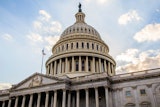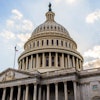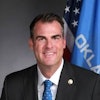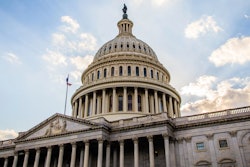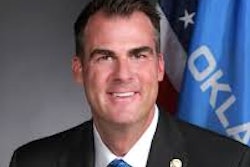An Overlooked Oasis?
Education advocates say two-year institutions should not be considered an afterthought, but rather belong at the centerpiece of the nation’s higher education agenda
By Kendra Hamilton
While the decision reached by the U.S. Supreme Court in June regarding the University of Michigan’s admissions policies is being rightly hailed by defenders of affirmative action and civil rights as a major victory, a rising chorus of higher education observers is pointing out that obsessing over what goes on at elite institutions is almost beside the point in terms of college access.
And that’s because “the numbers, especially of African Americans affected (by the decision), are very small,” says Dr. Brenda Simmons, president of the National Council on Black American Affairs (NCBAA), a leadership and policy arm of the American Association of Community Colleges.
Indeed, “the masses of Blacks who are in higher education are in the community colleges,” explains Dr. Castell Bryant, president of the medical center campus of Miami-Dade College. With 160,000 students enrolled for credit, it’s the nation’s largest community college and the No. 1 producer of minority associate’s degrees.
Bryant adds, “When it comes to access, we don’t need to be setting the standards or even measuring them by what happens at the university level.”
Dr. Carolyn Williams, president of Bronx Community College (BCC), emphatically agrees. “Community colleges are and have always been the port of entry,” says Williams, explaining that BCC has 8,000 credit and 25,000 continuing education students. “And it’s been that not just for minority students but also for the less-prepared students, for the adult students, for all those who are not traditional, right-out-of-high-school students.”
Numbers Versus Perceptions
Statistics bear those assertions out. According to U.S. Department of Education figures, nearly 1.5 million African Americans were enrolled in higher education at all levels in 2001. Fully 40 percent, or more than 604,000, were enrolled at the associate’s level.
Community colleges accounted for a large share of the degrees conferred to African Americans as well. Of degrees conferred in 2000, the second highest number, 28.8 percent, went to students at the associate’s level. The highest number, 50.3 percent, went to bachelor’s degree students, with students at the master’s, first professional and doctoral level trailing with 17.3 percent, 2.4 percent and .9 percent of the degrees conferred.
Moreover, throughout the 1980s and 1990s, community colleges had much greater success in attracting traditional students as well — i.e., those who enroll in college immediately after completing high school.
A little historical perspective is useful here. According to the National Center for Education Statistics, community-college enrollments began increasing rapidly as a percentage of the total degrees conferred, particularly in the ’80s and ’90s. And while projections for the current decade show that bachelor’s-granting institutions will regain their edge, as of 1999-2000, the latest year for which statistics are available, community colleges are still leading the way in degree-production increases for minorities. Degree production was up 11.7 percent at the associate’s degree level, compared with a rise of 5.8 percent at the bachelor’s degree level.
But while enrollments and degree production are up, they are only part of the picture. The inescapable fact is that community colleges still face an uphill battle in terms of public perceptions.
“There’s a lot of myth-busting that needs to be done every day,” says Dr. Janis Hadley, president of Housatonic Community College, a mid-sized school in Bridgeport, Conn., with an enrollment of 4,700, and “convener” of the President’s Roundtable, a group of African American community-college presidents affiliated with the NCBAA.
Community colleges are facing a serious “leadership dearth,” Hadley notes. “The ‘graying of America’ is really hitting our institutions” with a wave of retirements in the leadership ranks. Hadley adds that the President’s Roundtable and the NCBAA are seeking to halt the bleeding with programs aimed both at training the next cohort of presidents and middle managers.
“If we are really going to be able to impact the myths about students of color in our society, then we have to be more diligent about selecting who is teaching our students and who is an administrator for our students,” Hadley says. “Ultimately, it’s all about training the leaders who can select the right team to select the right faculty and staff to affect the students’ lives.”
But Hadley admits that recruitment can be difficult in a climate in which so many tend to look down on these institutions. Students in traditional master’s and doctoral programs don’t tend to look at community colleges when considering job options. And the disdain probably has its roots in the middle-class aspirations inculcated in the home. Indeed, middle-class Blacks are no less obsessed with rankings and status than the rest of the American middle class. Too often they dismiss community colleges as the home of “the leftover and the left out.”
But that’s an unfair and even a destructive characterization, Bryant argues. “We as Blacks are so caught up in names,” she says — as if admission to an elite school somehow guarantees one’s child success and happiness for life. “But I’ve seen kids who went to Ivy League schools jumping from job to job and even unemployed.
“We seem to want to pretend we’re beyond where we really are as a people in this society,” she adds. “But we have a number of first-generation African American college students still. And where they go (in terms of the name value of the school) is not the issue — that does not determine the contribution you’ll make.”
Rethinking College Choice
Dr. Walter G. Bumphus, president of the 50,000-student Louisiana Community and Technical College System, agrees that parents need to do some radical rethinking of their approach to the college choice issue. Community colleges should not be seen as the place one’s child goes when he or she can’t get in anywhere else, but as an alternative that’s superior not just financially but also academically.
“With my own children, my son went to the University of Maryland and my daughter went to Kentucky — but my youngest son started out at a community college,” Bumphus says. “This is a point that I make all the time in speeches: Not every kid is ready to go to LSU (the flagship institution) in our state. And that’s a point that’s not about their aptitude — it’s about their maturity.”
Of course, talk of serving the needs of the individual student may ring oddly coming from campuses serving anywhere from 8,000 to 160,000 students. But two-year institutions come in every shape and size. Consider the case of Clinton Junior College, an A.M.E. Zion institution founded in 1894 in Rock Hill, S.C. Clinton’s enrollment of 150 sounds tiny until one learns that during the low ebb of its history, enrollment had dropped to as low as 45 students.
The college has been brought back from the brink of closure by its dynamic new president, Dr. Elaine Copeland, who had a distinguished career as an associate vice chancellor at the University of Illinois, Urbana-Champaign, and as president of her alma mater, Livingstone College, before emerging from retirement to help Clinton in its fight for survival. And the future looks bright. Clinton won accreditation in April of this year and just received permission to begin accepting international students. Copeland imagines that enrollments will eventually rise to and hold the line at 300 students, and she thinks that size is just right.
“I do think that a small school such as Clinton provides access for many who would not otherwise be able to come to college,” Copeland says. “If the problem is finances, we can assist students with funding. If it’s the student’s high school record, we offer a G.E.D. program for students who have dropped out. They have a year to complete G.E.D., and they can then enroll in our undergraduate program.
“We also have a number of students who are first-generation college students and who might not do well at a larger school. But with the 15-to-1 student-to-teacher ratio and the small environment, it gives them the confidence to know they can do well.”
Another experiment in smaller group learning is happening at Miami-Dade College. Long known for its innovative programs in developmental education — also known as remedial education — the school is making strides in another direction under the leadership of President Eduardo Padron. The school recently dropped the word “community” from its name and began calling itself a college with the addition of its first four-year program in education and it has also graduated the first class in Padron’s signature initiative, the Honors College.
This highly diverse group of 75 elite students — they counted 22 countries of origin between them, from Israel to Rwanda to Venezuela — could have gone to college anywhere, says Dr. Alexandria Holloway, dean of the college. They all had scores of either 1200 on the SAT or 26 on the ACT, GPAs of at least 3.7 and stellar essays and interviews. But they chose the intense yet supportive program at Miami-Dade.
“They chose us because they knew the level of support would give them the edge,” Holloway says. “They know if they’d gotten into a big school, there might be as many as 500 kids in a class, and it would be taught by a TA. Here, they are taught by professors, and those professors prize teaching, are rewarded for teaching. Most have doctorates, have published, have endowed teaching awards, but most importantly they are caring professionals.”
And the care has paid off. Honors College students won acceptances to a stellar cadre of elite schools: Amherst, Notre Dame, Yale, Cornell, Georgetown, NYU, Columbia, Duke, Chapel Hill and Howard, to name just a few.
Questions Linger
But the questions linger. Are community colleges an overlooked oasis in the higher education landscape, a place where immature or unready students can find their feet before moving on to success in four-year institutions and perhaps beyond? Or is the picture much darker? Are they mills that churn students in and out in an endless round that’s profitable for the institutions but wasteful of student time and resources?
“I’ve certainly heard that criticism and it’s a great point, but there are so many myths surrounding community-college education,” Bumphus says. “There’s a myth that our courses don’t transfer to four-year institutions — that students will come in and take a lot of courses and end up unable to move on. That’s simply not true.”
In Louisiana, for example, there are articulation agreements allowing transfers to the Southern University system, and agreements are being worked out with Louisiana State University and even Jackson State in neighboring Mississippi, Bumphus says.
“There’s also a myth that students come and only a small percentage graduate. But it’s only recently that studies have asked, ‘What are the goals students enter community college with?’ Many of our students come for short-term retooling, retraining. Many already have baccalaureate degrees, master’s degrees, and they’re here for continuing ed or certification,” Bumphus adds.
Williams of BCC agrees. “I don’t think that student intent has been looked at until quite recently,” she says. “But there are new studies from the U.S. Department of Education that show quite clearly looking at graduation rates absent student intent is quite misleading. Many don’t intend to graduate. But those who come with the goal of baccalaureate transfer do so within six years. And they outperform students who started at senior colleges.”
The NCES’ “Condition of Education” report, published in 2003, does make the picture a bit plainer. A study of community college students who started school in 1995-1996 reveals that the number who entered such institutions with a degree goal was roughly three-quarters of the total, with another 10.8 percent indicating they were seeking a certificate and 15.6 percent indicating no degree goal.
Of those who expressed degree goals, the bachelor’s-associate’s breakdown was 33.6 percent to 66.4 percent. Slightly more than 50 percent of the bachelor’s degree seekers went on to transfer to four-year schools, while 26.5 percent of the associate’s degree seekers changed their minds and decided to move on to the next level as well.
But the gap between the groups shrunk significantly when measuring the next milestone: the numbers of students who persisted to attain a bachelor’s degree. Just over 80 percent of the bachelor’s degree seekers and around 79 percent of the associate’s degree group went on to earn those degrees, statistics that compare quite favorably to the national five-year college graduation rate for the same year.
Among “native” four-year students, most of whom presumably entered higher education with the intent to graduate, the graduation rate was 44.6 percent at public colleges and universities and 57.1 percent for private institutions, according to the ACT.
It’s true that community-college students take longer to finish their degrees, observers say, and the “Condition of Education” report confirms that as reality. Community-college students take an average of 71.1 months, or nearly six years, to complete their bachelor’s degrees, according to the report. This compares with 54.5 months, or 4 ½ years, at public four-year schools and 49.7 months, or just over four years, at private nonprofit institutions.
But Williams again points to student expectation. “Students don’t come with the expectation of completing a bachelor’s in four years. You’ll ask students, ‘What’s your goal?’ They might tell you, ‘Baruch (College) — I want a business management degree.’ Then you ask them their time frame, and they’ll just chuckle,” Williams explains. “They’ll say, ‘I’ll get my associate’s here (at Bronx Community College), but I’ll be going part time, so it’ll probably take 3 ½ years. Then I’ll be part time at Baruch, too…’
“So, yes, students are dropping in and out, but not always for academic reasons. There are financial reasons, family obligations.”
Indeed, the “Condition of Education” report notes that only 28.3 percent of community-college students who started in ’95-’96 were always able to attend full time, with 78.9 percent of that number persisting to graduation. Meanwhile, the number only able to attend part time was a whopping 71.7 percent, but 81.3 percent of those students persisted to graduation.
Given statistics like these, it’s clear that rather than being an afterthought, community colleges belong at the centerpiece of the nation’s higher education agenda.
“There is absolutely one in everybody’s neighborhood. For that reason, you should never take the community college for granted,” says the NCBAA’s Simmons, who also serves as executive dean of Florida Community College, North Campus.
“We are a very viable choice that students can make right out of high school. Additionally, we are a place for adults to return and get the education that they have longed for for years or the re-education they need to pursue another career. We have something for every person in the family, from liberal arts to work preparedness to continuing education,” she says.
“We are a vital part of the chain in the journey to postsecondary education,” adds Bumphus.
And they’re an even more vital part of the chain for African American students.
“We spend a lot of time talking about and defining why things aren’t working” in education, Hadley says. And oftentimes, this obsessive focus on perfection prevents us from seeing the things that really do work. “So you can either look at the picture as a massive set of problems that no one will ever resolve, or realize there really is a way of affecting systemic change. But part of being able to make that change is accepting who it is we have to work with.
“Not everybody will be top 10 or bottom 10, but all can be served,” Hadley says. “We have students who know exactly what they want to do and they know how to get there. But more often than not, they don’t have a clue. They’re at the door and they have no idea what to do next. And our job is to work with them and help them come up with a plan A, a plan B, to define goals and to attain those goals. We can affect success by working with who we have, whether it’s at the kindergarten level or fourth grade, or at a community college or at the bachelor’s or master’s level.”
“This is the country we have,” Hadley says. “No one’s going away. We all are going to be here. And if we’re all going to be taxpayers, we’ve got to start right where we are.”
© Copyright 2005 by DiverseEducation.com
